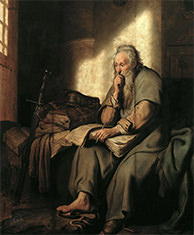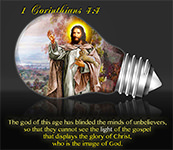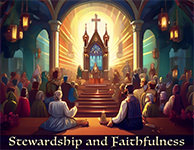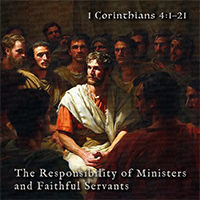First Corinthians 4:1–21 . . .
Attitudes “of” and “toward” Church Leadership
As we read chapter 4, we’ll quickly see that the Corinthian church has a leadership crisis that we might call “Follow the Leader.” Small cliques have attached themselves to leaders in whom they take pride. Highly regarded in the secular world, these leaders are chosen because of their message and methods. Their content is thought to be the essence of wisdom, while their methods are powerful. Viewed simply from the standpoint of numbers, the church may be experiencing significant growth.
From Paul’s statements in the first three chapters of his first letter to the Corinthian church body, one would suppose that each clique is a personal following of one of the apostles, of Paul, Apollos, or Peter. We should already have concluded that the apostles themselves aren’t the problem; they’re not competing with one another for positions of power and prominence. If we think the rivalry at Corinth is between the followers of certain apostles like Paul or Apollos or Peter, then Paul has a surprise for us here in chapter 4. Meanwhile, in v. 6 (see below), Paul indicates that the real cliques have been established around personal allegiance to certain unnamed men who are not apostles. As Paul’s two letters to the Corinthians continue to unfold, it becomes increasingly clear that some of these leaders are spiritual (1 Cor. 14:37–38) while some aren’t even believers, but rather are “false apostles” (2 Cor. 11:12–15).
In contrast to the “leadership” of these cult-like leaders, enter Apostle Paul. Here in chapter 4, he speaks of himself, along with his fellow-apostles, informing the Corinthians of the way in which he and his colleagues should be regarded (vv. 1–5). He then exposes the real leadership problem at Corinth, outlining the dramatic contrast between the way the Corinthians view themselves and the way they view Paul (vv. 6–13). Verses 14–17 express Paul’s emotional appeal to the Corinthians to heed his instruction and follow his leadership. The final verses (vv. 18–21) contain a warning for those who won’t repent of their error. Paul will come to them; if need be, he’ll bring “a rod.”
Note: 1st Corinthians challenges believers to examine every aspect of their lives through the lens of the Gospel. In chapters 1–4, Paul presents these four challenges:
Christ is God’s wisdom (ch. 1) | Spiritual wisdom (ch. 2)
The church and its leaders (ch. 3) | True apostleship (ch. 4)
› Watch BibleProject’s superb animated video (1 min.) that highlights Paul’s messages in these first four chapters.
† Summary of 1 Corinthians 4:1–21
This is a significant passage in Paul’s letter to the Corinthian church, addressing several important themes:• Paul’s Apostolic Authority (vv. 1–5)
We see in this opening passage (shown at the bottom of this page) Paul’s apostolic authority as being crucial for understanding his leadership and message to the Corinthian church. He begins by asserting his role as a servant of Christ and steward of God’s mysteries. He emphasizes that it’s God who judges him, not the Corinthians or any human court. This establishes his apostolic authority while maintaining humility before God.
There are three key aspects of its importance: (1) As a foundation for unity in the Corinthian church, Paul emphasizes that his authority is rooted in his role as a servant of Christ and steward of God’s mysteries (vv. 1-2); (2) As a model of humility and faithfulness, his self-description as an oikonomos (Greek for steward or administrator) reflects humility and accountability to God rather than self-promotion; and (3) as a basis for moral and spiritual correction, he uses his authority to address doctrinal and moral issues within the church, such as divisions (chapters 1–3) and immorality (chapter 5).
• Stewardship and Faithfulness (vv. 6–7)
In the next two verses, the apostle Paul emphasizes stewardship and faithfulness as critical aspects of Christian leadership and life. Here are three reasons why they’re important: (1) By offering humility before God, Paul reminds the Corinthians that everything they have — spiritual gifts, knowledge, or status — has been received from God, which underscores that they’re stewards, not owners, of God’s blessings; (2) By being accountable to God as stewards, believers are to wisely manage what he’s entrusted to them…faithfulness, rather than success by worldly standards, is the measure of a steward’s worth; (3) By highlighting unity and avoidance of division, Paul uses this teaching to address divisions in the Corinthian church. By focusing on their role as faithful stewards under Christ, believers are reminded that their allegiance is to God, not human leaders.
In summary, stewardship and faithfulness emphasize humility, accountability to God, and unity in the church, aligning believers’ focus with God’s purposes rather than human pride or competition.
• Warning Against Pride and Division (vv. 8–10)
Apostle Paul addresses pride and division in the Corinthian church with biting irony, highlighting a few important lessons: Exposing spiritual pride; contrasting apostolic humility; emphasizing the root of division; and calling for unity through humility. He admonishes the Corinthians for their pride and divisiveness. He ironically contrasts their self-perceived wisdom and strength with the apostles’ weakness and suffering. This approach serves to challenge their worldly attitudes while encouraging unity.
• Apostolic Hardships (vv. 11–13)
Paul describes the hardships and sufferings he and other apostles endure for the sake of the gospel. This serves as a contrast to the Corinthians’ pride while representing the model of Christ-like servanthood. He Paul describes the apostles as enduring hunger, thirst, homelessness, and ridicule, presenting their lives as a reflection of Christ’s suffering and humility. Next he contrasts the Corinthians’ pride and self-perceived wisdom with the apostles’ lowly state. Through their hardships, Paul presents the apostles as examples for the Corinthians to imitate (v. 16). By sharing their struggles, Paul reinforces his authority as an apostle who has sacrificed everything for the gospel.
• Paul’s Fatherly Role (vv. 14–17)
A key aspect of this passage is Paul’s portrayal of himself as a spiritual father to the Corinthians. He uses the “father” metaphor to:
† Express his deep care and concern for them
† Assert his authority as their founder in the faith
† Encourage them to imitate his example
This father-child relationship implies expectations of obedience and respect, while following Paul’s teachings and way of life in Christ.
• Paul’s Impending Visit (vv. 18–21)
The passage concludes with Paul’s announcement of his planned visit to Corinth. He presents them with a choice: he can come with a disciplinary rod or in love and gentleness. This reinforces his authority while offering an opportunity for the Corinthians to correct their behavior.
In essence, chapter 4 addresses the key issues of leadership, authority, servanthood, humility, and faithful service in the context of the early Christian community. Paul uses various metaphors and rhetorical strategies to challenge the Corinthians’ worldly attitudes, encouraging them towards greater spiritual maturity and unity.
- Q. 1 Corinthian factions judged one another by the reputation of the leader they followed. What then does Paul mean by entering the proverb in v. 6? How should they apply it?
- Q. 2 Read v. 7. What do you have today that you didn’t receive from God? Of everything that God has given you, for what do you tend to take credit?
- Q. 3 What contrasts does Paul make between himself and the Corinthians in vv. 8–13? What point is he making?
1 Corinthians 4:1–21
New International Version (NIV)
[You can view it in a different version by clicking here; you can also listen to this chapter.]
The Nature of True Apostleship
1This, then, is how you ought to regard us: as servants of Christ and as those entrusted with the mysteries God has revealed. 2Now it is required that those who have been given a trust must prove faithful. 3I care very little if I am judged by you or by any human court; indeed, I do not even judge myself. 4My conscience is clear, but that does not make me innocent. It is the Lord who judges me. 5Therefore judge nothing before the appointed time; wait until the Lord comes. He will bring to light what is hidden in darkness and will expose the motives of the heart. At that time each will receive their praise from God.
6Now, brothers and sisters, I have applied these things to myself and Apollos for your benefit, so that you may learn from us the meaning of the saying, “Do not go beyond what is written.” Then you will not be puffed up in being a follower of one of us over against the other. 7For who makes you different from anyone else? What do you have that you did not receive? And if you did receive it, why do you boast as though you did not?
8Already you have all you want! Already you have become rich! You have begun to reign — and that without us! How I wish that you really had begun to reign so that we also might reign with you! 9For it seems to me that God has put us apostles on display at the end of the procession, like those condemned to die in the arena. We have been made a spectacle to the whole universe, to angels as well as to human beings. 10We are fools for Christ, but you are so wise in Christ! We are weak, but you are strong! You are honored, we are dishonored! 11To this very hour we go hungry and thirsty, we are in rags, we are brutally treated, we are homeless. 12We work hard with our own hands. When we are cursed, we bless; when we are persecuted, we endure it; 13when we are slandered, we answer kindly. We have become the scum of the earth, the garbage of the world — right up to this moment.
Paul’s Appeal and Warning
14I am writing this not to shame you but to warn you as my dear children. 15Even if you had ten thousand guardians in Christ, you do not have many fathers, for in Christ Jesus I became your father through the gospel. 16Therefore I urge you to imitate me. 17For this reason I have sent to you Timothy, my son whom I love, who is faithful in the Lord. He will remind you of my way of life in Christ Jesus, which agrees with what I teach everywhere in every church.
18Some of you have become arrogant, as if I were not coming to you. 19But I will come to you very soon, if the Lord is willing, and then I will find out not only how these arrogant people are talking, but what power they have. 20For the kingdom of God is not a matter of talk but of power. 21What do you prefer? Shall I come to you with a rod of discipline, or shall I come in love and with a gentle spirit?



